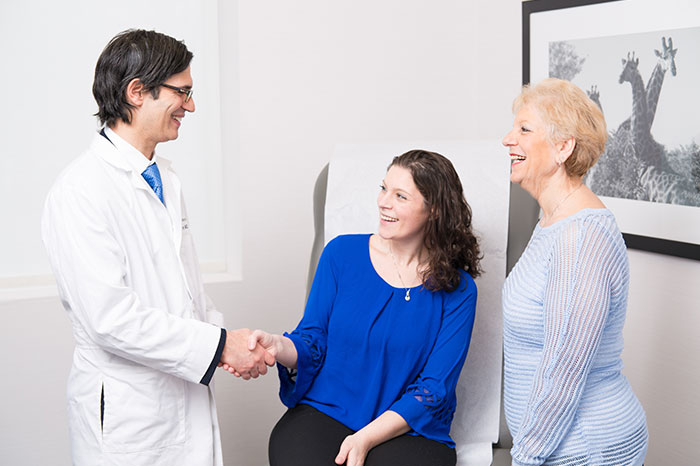If you have been struggling with your weight for years and traditional weight loss approaches have been unsuccessful at achieving your weight loss goal and keeping the weight off, you may be considering the adjustable gastric band as the solution to your health concerns. As Suffolk County’s foremost center for weight loss surgery, New York Bariatric Group can provide you with the tools you need to lose your excess body weight, control or eliminate any health conditions associated with the excess weight, and help you achieve the body shape and health you want.
Suffolk Gastric Band

Adjustable Gastric Banding - The Lap-Band Procedure
About This Procedure
FAQs
New York Bariatric Group
What Is The Adjustable Gastric Band?
You may know it as lap band or laparoscopic adjustable banding. Gastric band surgery is performed laparoscopically; which means it is done through 5 one-inch incisions. During the procedure, the surgeon places a hollow silicone band around the top portion of the stomach that is cinched to create a small pouch a bit larger than a plum. The small pouch and the constricted opening between the pouch and the rest of the stomach limits the amount of food you will be able to eat and slows down your digestion. It will also help you feel full and satisfied much faster when you eat.
The band is connected to a small port located just under the skin on the chest wall. Through that port, your surgeon can later adjust the tightness of the band by adding or removing saline solution in response to your individual needs and progress.
Most patients can expect to lose approximately 50 to 60% of their excess body weight within the first 36 months following the surgery. You should also experience better overall health after the surgery and be far less likely to develop weight-related conditions like high blood pressure, type 2 diabetes or arthritis later in life. Most patients who already had these kinds of conditions before the surgery found great improvement and in some cases, they completely went away.
Laparoscopic gastric band surgery also boasts the fastest recovery time of all the bariatric procedures due to its less invasive nature. Most patients can return to work within 5 days and experience full recovery within two weeks.
Gastric band surgery has fewer possible associated risks of post-operative complications than other bariatric surgery since it is comparatively less invasive. There is also less risk of the patient experiencing nutritional deficiency since the body’s ability to absorb nutrients is not affected. If needed, the procedure can also be reversed in the future.
What are the Risks and Possible Side Effects?
It is important to note that all major surgeries have a certain amount of risk associated with them and you should have a clear understanding of all the risks connected with your surgery. You should discuss the risks and possible side effects of all the weight loss surgeries with your surgeon before deciding which one is best suited to you.
The most serious possible risks and side effects associated with gastric band surgery include deep-vein thrombosis or pulmonary embolus, gastric band erosion, slippage or prolapse. In the most serious cases, further surgeries and extended hospital stays may be required.
Other common side effects that patients sometimes experience include nausea, heartburn, and vomiting, gallstones, dilation of the gastric pouch, infection or leaking from the port, muscle loss, and excess skin.
What Happens After the Surgery?
At New York Bariatric Group’s Suffolk County office, we look at our relationship with patients as a life-long partnership in your health and wellbeing. That’s why we place so much importance on our aftercare program.
You will receive a comprehensive post-surgery plan that you will need to follow closely in order to achieve the best possible results. The plan will help you adopt a healthy, active lifestyle tailored to the needs of a bariatric patient in the days, weeks and months that follow surgery.
Diet: You will be restricted to soft, mushy or pureed foods, as well as liquids for the first four weeks after the surgery. After that, you will be able to reintroduce solid foods. Your meal portions will be much smaller and priority will be given to high protein foods to help avoid muscle loss. You will need to chew your food very well going forward. You will also be instructed to cut out certain foods like sugary or carbonated beverages such as sodas.
Exercise: Being physically active is an essential component of any healthy lifestyle. For bariatric surgery patients, it is even more important as it serves to minimize muscle loss, improve mobility and helps to curb the appetite.
Follow-Up Visits: Through regular return visits to our office, we will monitor your post-surgery progress and make sure your weight loss is occurring as expected and in a healthy fashion. You surgeon will also be able to adjust your gastric band according to your individual needs and situation. These subsequent visits will be crucial and should not be missed.
If you think Gastric Band surgery might be the right solution for your weight loss, please contact the Suffolk County office of New York Bariatric Group today.
Start your weight loss journey today! At the New York Bariatric Group we combine long-term experience, top-tier patient care, and expert guidance to guide you through the journey to successful weight loss.
